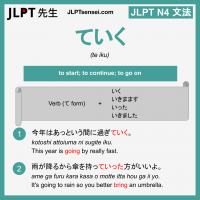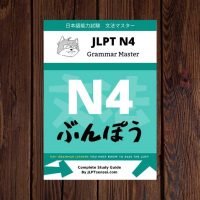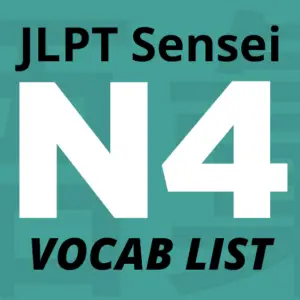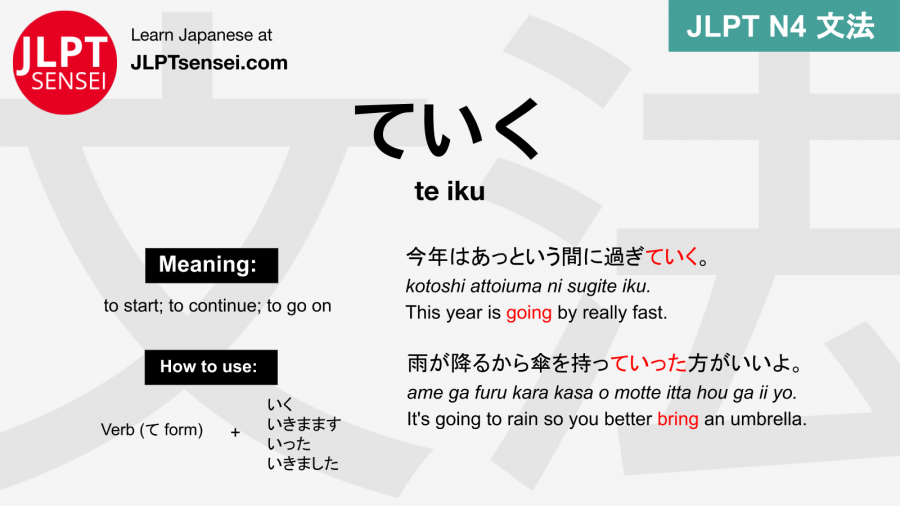Aprende gramática del idioma Japonés: ていく (te iku) / ていった (te itta). Significado: to start; to continue; to go on.
This is used after a verb to express a continued change in state, usually for something that moves away from the speaker (not necessarily a physical movement), or away from another person’s viewpoint.
For something that moves towards the speaker, instead use てくる (te kuru).
How To Use:
This grammar requires the use of て form. If you don’t know how to conjugate it, you can reference this table.
If you already know how to use て form, skip down to the examples.
| Ending | Dictionary | Changes to... | て form |
|---|---|---|---|
| う verbs (u) | |||
| す | 話す(はなす) | す → して | 話して(はなして) |
| く ぐ |
書く(かく) 泳ぐ(およぐ) |
く → いて ぐ → いで |
書いて(かいて) 泳いで(およいで) |
| む ぶ ぬ |
飲む(のむ) 遊ぶ(あそぶ) 死ぬ(しぬ) |
む → んで ぶ → んで ぬ → んで |
飲んで(のんで) 遊んで(あそんで) 死んで(しんで) |
| る う つ |
切る(きる) 買う(かう) 持つ(もつ) |
る → って う → って つ → って |
切って(きって) 買って(かって) 持って(もって) |
| る Verbs (ru) | |||
| 食べる(たべる) | る → て | 食べて(たべて) | |
| Irregular Verbs (exceptions) | |||
| する | して | ||
| 来る(くる) | 来て(きて) | ||
| 行く(いく) | 行って(いって) | ||

Click the image to download the flashcard.
Download all N4 grammar flashcards.

Download our complete
JLPT N4 Grammar Master E-book.
Access ALL extra downloads, ebooks, and study guides by supporting JLPT Sensei on Patreon.
ていく - Oraciones de ejemplos 例文
Cada oración de ejemplo incluye ayudas como la lectura (hiragana) en Japónes, la lectura en romaji, y la traducción en Español.
Da clic en el siguiente botón rojo para alternar todas las ayudas, o puedes dar clic en los botones individuales para mostrar únicamente las que desees ver.
Ejemplo #1
歩いていく。
Ejemplo #2
彼は毎日駅まで歩いていきます。
Ejemplo #3
船は港を出ていった。
Ejemplo #4
彼は京都へ引っ越していった。
Ejemplo #5
今年はあっという間に過ぎていく。
Ejemplo #6
何も言わずに部屋を出ていきました。
Ejemplo #7
私は日本語を聞くことに慣れていきました。
Ejemplo #8
雨が降るから傘を持っていった方がいいよ。
Ejemplo #9
それは今後決定していきます。
Ejemplo #10
結婚してからも仕事を続けていくつもりです。
Vocabulario 語彙
| Kanji 漢字 |
Kana カナ |
English 英語 |
|---|---|---|
| 歩く | あるく | to walk |
| 結婚 | けっこん | marriage |
| 仕事 | しごと | work |
| 続く | つづく | to continue |
| つもり | plan | |
| 今年 | ことし | this year |
| あっという間に | あっというまに | just like that |
| 過ぎる | すぎる | to pass by |
| 彼 | かれ | he |
| 京都 | きょうと | Kyoto |
| 引っ越す | ひっこす | to move |
| 船 | ふね | boat |
| 港 | みなと | port; harbor |
| 雨が降る | あめがふる | to rain |
| 傘 | かさ | umbrella |
| 持っていく | もっていく | to bring |
| 今後 | こんご | from now on |
| 決定 | けってい | decide |
| 毎日 | まいにち | every day |
| 駅 | えき | station |
| 私 | わたし | I |
| 聞く | きく | to listen; to ask |
| 慣れていく | なれていく | to get used to |
| 何も | なにも | nothing |
| 部屋 | へや | room |
| 出ていく | でていく | to leave; to go |
Ver todas las lecciones de gramática del JLPT N4



